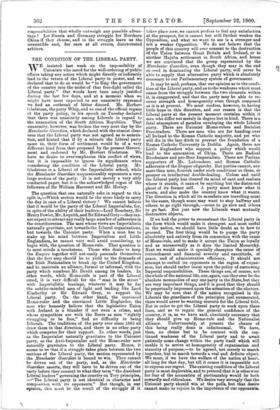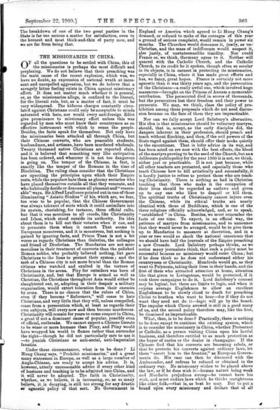TFrE CONDITION OF THE LIBERAL PARTY.
1ViTE insisted last week on the impossibility of Unionists who cared for the well-ordering of public affairs taking any action which might directly or indirectly -lead to the return of the Liberal party to power, and we declared that to do so would be "to fling the government of the country into the midst of that free-fight called the Liberal party." Our words have been amply justified during the last few days, and at a moment when we might have most expected to see unanimity expressed we find an outbreak of bitter discord. Mr. Herbert Gladstone, the party Whip, and so one of the official organs of the party policy, in his speech on Tuesday declared that there was unanimity among Liberals in regard to the annexation of the South African Republics. That unanimity, however, was broken the very next day by the Manchester Guardian, which declared with the utmost clear- ness that the Liberal party was not agreed as to annexa- tion, and hinted that if by a miracle the Liberal party came in, their form of settlement would be of a very different kind from that proposed by the present Govern- ment and endorsed by Mr. Herbert Gladstone. We have no desire to over-emphasise this conflict of views, but it is impossible to ignore its significance when considering the condition of the Liberal party. Mr. Gladstone is a Liberal of the Imperialistic school, while the Manchester Guardian unquestionably represents a very large section of the party. It is not merely a very ably conducted paper, but it is the acknowledged organ of the followers of Sir William Harcourt and Mr. Morley.
The question that one naturally asks in regard to this split is,—Which section would be the more likely to carry the day in case of a Liberal victory ? We cannot believe that it would be the party of the Liberal Imperialists, for, in spite of the ability of their leaders—Lord Rosebery, Sir Henry Fowler, Mr. Asquith, and Sir Ed ward Grey—they can- not expect to attract any really large number of adherents in the constituencies. The men whose views are Imperialistic naturally gravitate, not towards the Liberal organisations, but towards the Unionist party. When a man has to make up his mind between Imperialism and Little Englandism, he cannot very well avoid considering, to begin with, the question of Home-rule. That question is to most minds a touchstone. Those who desire to keep the Empire together will not easily persuade themselves that the first step should be to yield to the demands of the Irish Nationalists to break up the United Kingdom, and to maintain an alliance, formal or informal, with the party which numbers Mr. Da,vitt among its leaders. In other words, while Hume-rule is part of the Liberal creed, it is very difficult for the "man in the street" with Imperialistic leanings, whatever it may be for the subtler-minded men of light and leading like Lord Kimberley or Sir Edward Grey, to support the Liberal party. On the other hand, the convinced Home-ruler and the convinced Little Englander, the men who honestly believe that the legislative Union with Ireland is a blunder if not even a crime, and whose sympathies are with the Boers as men "rightly struggling to be free," find no difficulty in being Liberals. The traditions of the party ever since 1885 all draw them in that direction, and there is no other party which competes for their support. In other words, just as the Imperialist naturally gravitates to the Unionist party, so the Anti-Imperialist and the Home-ruler now naturally gravitates to the Liberal party. Hence, it seems to us that if a struggle takes place between the two sections of the Liberal party, the section represented by the Manchester Guardian is bound to win. They cannot be driven out of the party, and, as the Manchester Guardian asserts, they will have to be driven out of the Party before they consent to what they term "the dissident Liberal leaders" governing the country on Tory principles, —" The Liberal party is not identical in character and composition with its opponents." But though, in our opinion, this must be the result of the struggle if it takes place now, we cannot profess to feel any satisfaction at the prospect, for it cannot but still further weaken the Opposition, and what we want to see is a stronger and not a weaker Opposition. We do not believe that the people of this country will ever consent to the destruction of the Union between Great Britain and Ireland, or to another Majuba settlement in South Africa, and hence we are convinced that the group represented by the Manchester Guardian, even though they may in the end su .ceed in dominating the Liberal party, will never be able to supply that alternative party which is absolutely necessary to our Parliamentary system of government.
It may be said, perhaps, that our opinion as to the condi- tion of the Liberal party, and as to the weakness which must ensue from the struggle between the two elements within it, is exaggerated, and that the party may be able to re- cover strength and homogeneity even though composed as it is at present. We must confess, however, to having little hope in this direction, and our reason is that the Liberal party at the present moment contains within it men who differ not merely in degree but in kind. There is a fatal atmosphere of paradox enveloping the whole Liberal party. There are Unionist Home-rulers and Socialist Free-traders. There are men who are for handing over all Ireland to the Roman Catholic majority, and yet who will die in the last ditch to prevent the foundation of a Roman Catholic University in Dublin. Again, there are Little Englanders who support a policy which would lead to the annexation of China. There are Radical Rhodesians and pro-Boer Imperialists. There are Puritan supporters of Mr. Labouehere and Roman Catholic adherents of the Dopper oligarchy. But parties cannot, any more than men, flourish under such conditions as these, or prosper on intellectual double-dealing. Unless and until the Liberal party has cleared its mind of cant and realises where it stands, it cannot be anything but the distracted ghost of its former self. A party must know what it wants, and also make the country know what it wants. The direction in which all its members are travelling must be the same, though some may want to stop halfway and others to go right through,—some to go slow and others to go fast. But just now the Liberals want mutually destructive objects.
If we had the power to reconstruct the Liberal party in the form which would make it strongest and most useful to the nation, we should have little doubt as to how to proceed. The first thing would be to purge the party absolutely and entirely from its connection with the cause of Home-rule, and to make it accept the Union as loyally and as unreservedly as it does the limited Monarchy. Next we would make it specially champion the cause of retrenchment and financial severity and exactitude, of peace, and of administrative efficiency. It should not attempt to outbid its opponents in the region of expan- sion, but should rather insist upon the policy of narrowing Imperial responsibilities. These things are, of course, not the whole of the national life, nor, again, can they ever be the absolute monopolies of any one party in the State, but they are very important things, and it is good that they should be perpetually impressed upon the attention of the electors. We may be sure that if the nation recognised in the Liberals the guardians of the principles just enumerated, there would never be wanting recruits for the Liberal fold. But in order to get the Liberal party to work upon these lines, and so to regain the general confidence of the country, it is, as we have said, absolutely necessary that they should give up Home-rule and the Nationalist alliance. Unfortunately, at present the chance of this being really done is infinitesimal. We have, then, no choice but to be content with the con- tinued weakness of the Liberal party and to await patiently some change within the party itself which will enable it to arrive at homogeneity of organisation and sincerity of purpose,—to be agreed, not merely to march together, but to march towards a real and definite object. We must, if we have the welfare of the nation at heart, all long for that day, but till it comes it is impossible not to express our regret. The existing condition of the Liberal party is most deplorable, and to pretend that it is otherwise for fear of the accusation of partisanship would be both cowardly and ridiculous. We desire very strongly that the Unionist party should win at the polls, but that desire cannot make us rejoice in the impotence of our opponents. The breakdown of one of the two great parties in the State is far too serious a matter for satisfaction, even to the keenest and most thick-and-thin of party men, and we are far from being that.







































 Previous page
Previous page